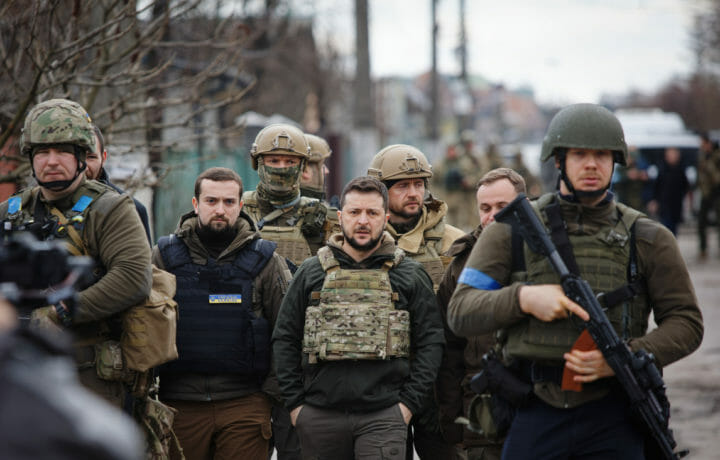It would be easy, largely based on western media reports, to believe that the entirety of the Ukrainian population has been unified against Russia. Yet, many in the Kremlin, including Russian Federation President Vladimir Putin expected that Russian forces would be greeted as heroes and liberators. In fact, there have been reports that Russian troops arrived with dress uniforms rather than cold weather equipment, and that the soldiers expected they’d be deployed for parades where they would be given flowers from a grateful population. Nearly five months later the fighting continues, and most Ukrainians have stood by the government in Kyiv.
However, clearly, not everyone has supported the efforts to defend the country from the invasion.
Just this month, Ukrainian President Volodymyr Zelensky announced that 30 government officials have been dismissed following allegations that their respective agencies had harbored “collaborators and traitors.” The shakeup began on Sunday, July 17 when Prosecutor General Iryna Venediktova and security chief Ivan Bakanov were sacked amid a high number of cases of suspected treason involving Ukrainian law enforcement.
Just a day later, 28 additional officials had been suspended.
According to a report from CBS News, Zelensky said that there were more than 650 cases of suspected treason and aiding and abetting Russia by Ukrainian security officials. Those officials are currently being investigated, and it includes some 60 cases involving officials who have remained in territories occupied by Russia and are believed to have worked against Ukraine.
“Such a great number of crimes against the foundations of national security and the connections established between Ukrainian law enforcement officials and Russian special services pose very serious questions to the relevant leaders,” Zelensky said during his weekly address.
“Six months into the war, we continue to uncover loads of these people in each of these agencies,” said Andriy Smirnov, deputy head of Ukraine’s presidential office.
What is especially noteworthy of those who have been given the boot is that Bakanov has been reported to be a childhood friend and former business partner of Zelensky, who had appointed him to head the SBU. However, Bakanov had come under growing criticism over security breaches since the war began. Likewise, Venediktova had won international praise for her drive to gather war-crimes evidence against Russian military commanders and officials.
Ukrainian Turncoats
In the case of Bakanov and Venediktova, their respective dismissals is more about failure to root out potential spies within the Ukrainian government, but there have been several notable past cases of those who have openly supported Russia.
This first occurred in 2014, after Moscow annexed Crimea. It not only absorbed the land but also the people who lived there.
In addition, Russia took 75% of the Ukrainian Navy’s fleet, as well as the majority of its helicopters. Only the Hetman Sahaidachny, a frigate that later served as the flagship of the Ukrainian Navy, wasn’t taken by Moscow – and only then because she was at sea. There had even been reports that the crew defected to Russia, which it hadn’t. The frigate remained in service with Kyiv’s “mosquito fleet” until this past February when the vessel was scuttled to keep it from being captured by Russia.
Moscow didn’t just gain the Crimea and most of Ukraine’s warships in 2014; it also gained a number of high-ranking officers including Denis Valentinovich Berezovsky, the former commander of the Ukrainian Navy. He defected to the self-declared pro-Russian separatist Crimean government just a day after as his former superior Sergi Stanislavovich Yeliseyev had also defected to Russia.
In total, some 50% of the Ukrainian forces in Crimea defected to the Russian military, and Russian state media at the time reported that more than 16,000 former servicemen and civilian personnel were provided with Russian passports, and many received new jobs or postings.
Fighting the Fifth Column
In addition to combating the Russian invaders, Ukraine’s government continues to contend with the so-called “fifth columns” – those domestic actors who work to undermine the national interest, often in cooperation with external rivals. The origin of the term dates back to the Spanish Civil War, in which Nationalist leader Francisco Franco alleged that four Nationalist columns were approaching Madrid, while a fifth column was waiting to attack from within.
The term gained widespread use in the Second World War to warn of potential sedition and disloyalty. However, more recently, it does seem that the Kremlin was counting on fifth columnists in Ukraine to help ensure a swift victory. Interestingly, Putin has referred to objectors to his invasion of Ukraine as fifth columnists who “can’t do without foie gras, oysters, or the so-called gender freedoms.”
Russia has largely been able to crack down on such objectors, in part due to its control of virtually all media within the country. For Ukraine, the danger of fifth columnist clearly remains, but it is hard not to believe that the majority stand ready to defend their nation.




